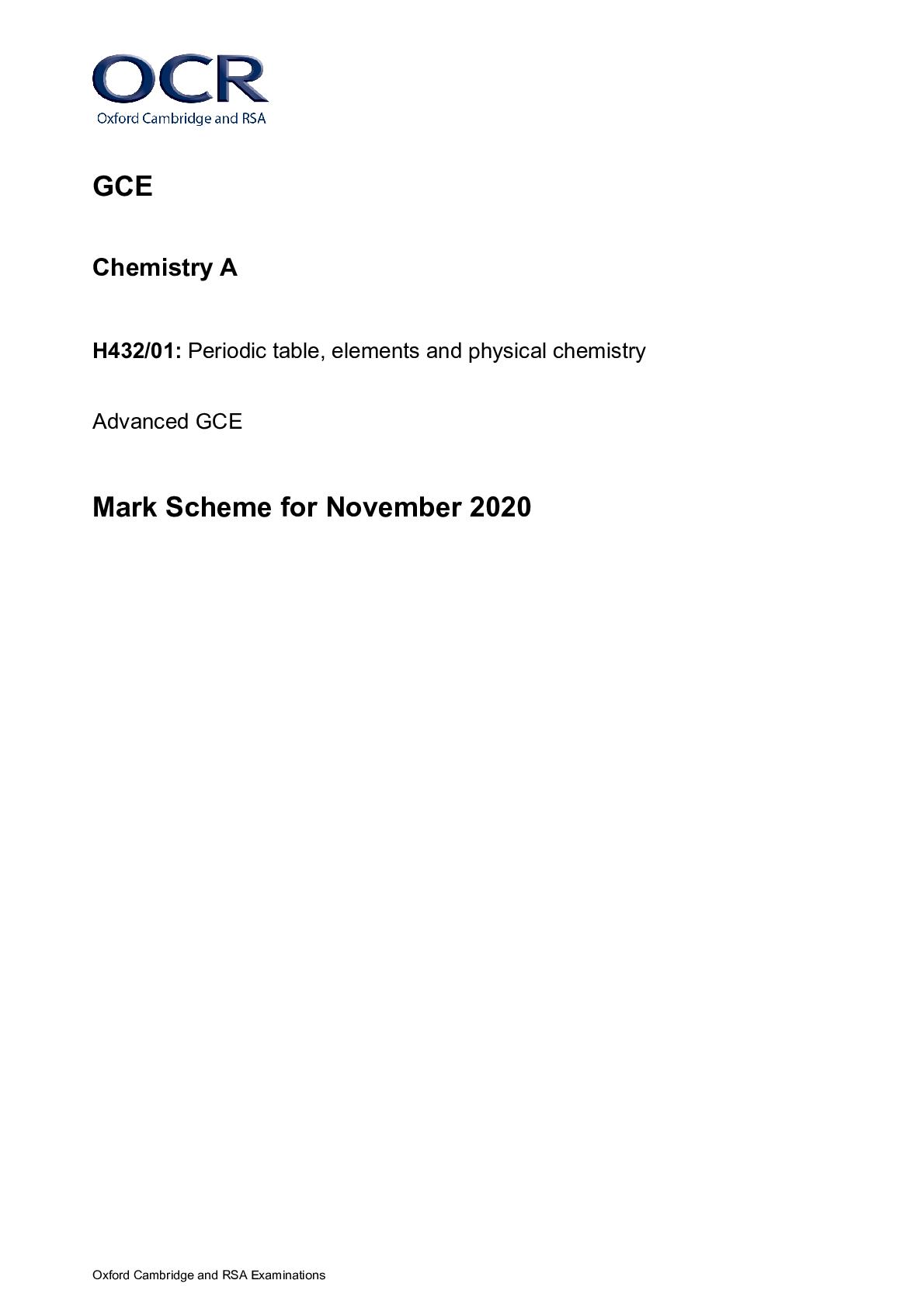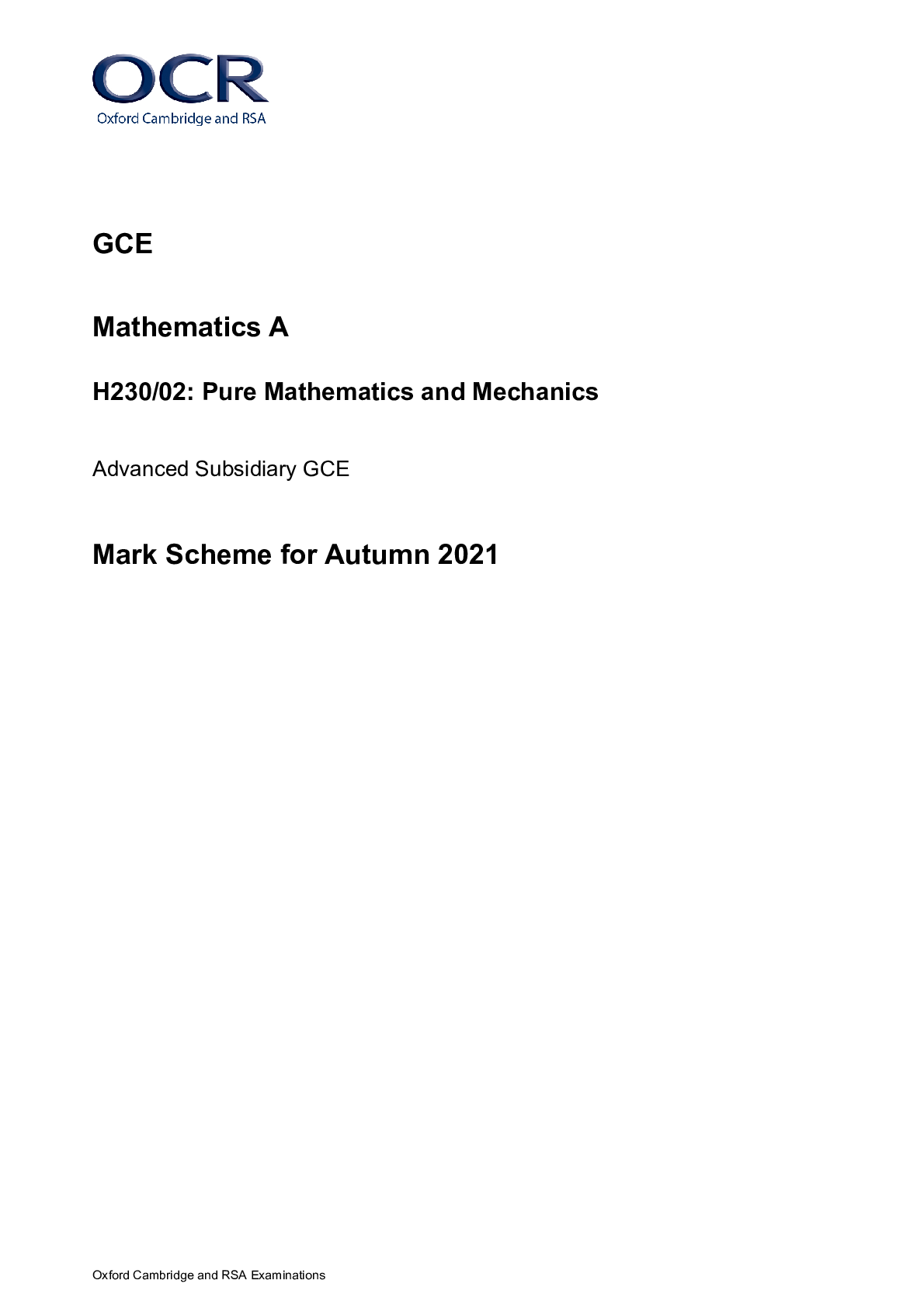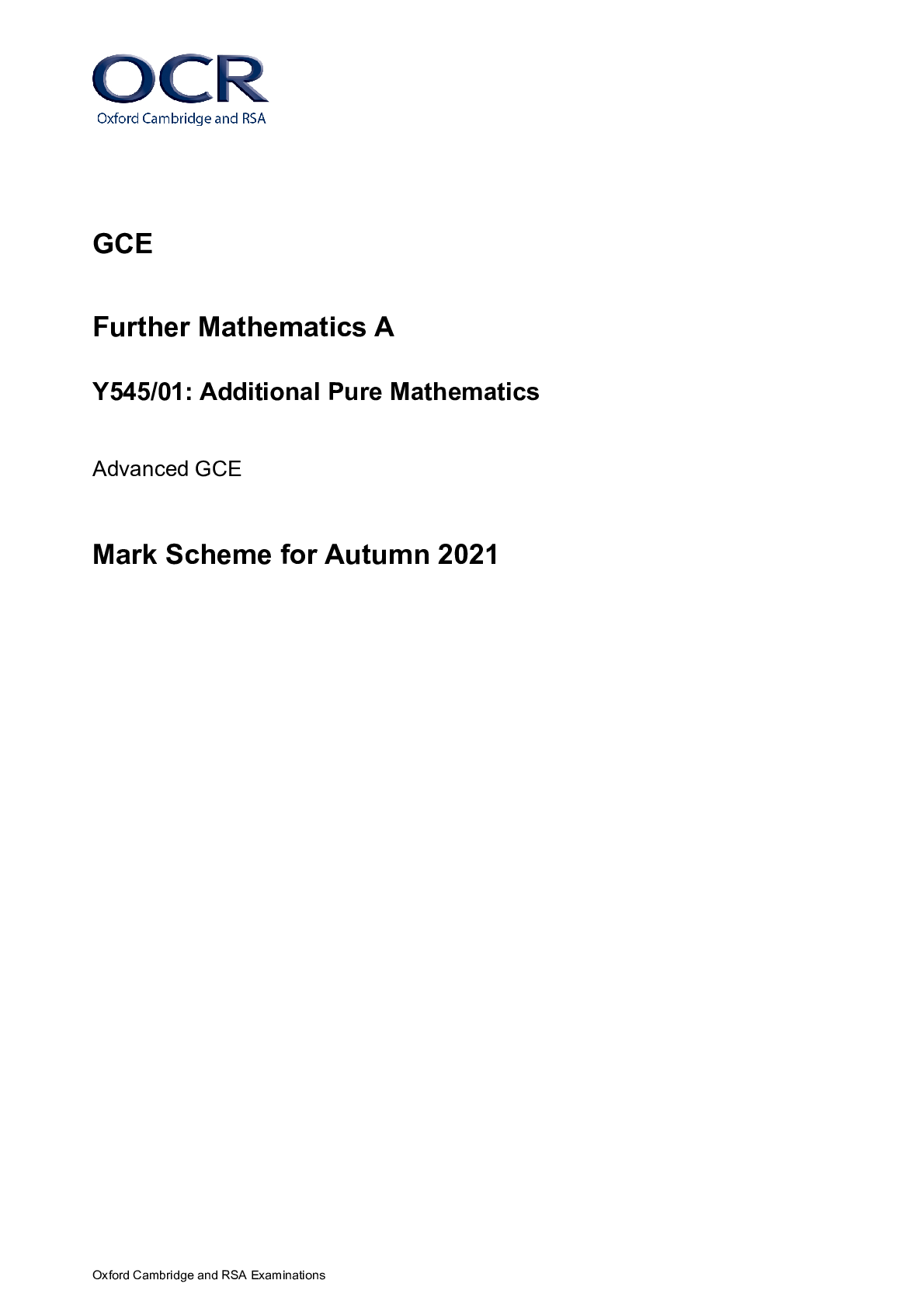History > AS Mark Scheme > GCE History A Y218/01: International relations 1890-1941 Advanced GCE Mark Scheme for November 2020 (All)
GCE History A Y218/01: International relations 1890-1941 Advanced GCE Mark Scheme for November 2020
Document Content and Description Below
Oxford Cambridge and RSA Examinations GCE History A Y218/01: International relations 1890-1941 Advanced GCE Mark Scheme for November 2020Oxford Cambridge and RSA Examinations OCR (Oxford Cambrid... ge and RSA) is a leading UK awarding body, providing a wide range of qualifications to meet the needs of candidates of all ages and abilities. OCR qualifications include AS/A Levels, Diplomas, GCSEs, Cambridge Nationals, Cambridge Technicals, Functional Skills, Key Skills, Entry Level qualifications, NVQs and vocational qualifications in areas such as IT, business, languages, teaching/training, administration and secretarial skills. It is also responsible for developing new specifications to meet national requirements and the needs of students and teachers. OCR is a not-for-profit organisation; any surplus made is invested back into the establishment to help towards the development of qualifications and support, which keep pace with the changing needs of today’s society. This mark scheme is published as an aid to teachers and students, to indicate the requirements of the examination. It shows the basis on which marks were awarded by examiners. It does not indicate the details of the discussions which took place at an examiners’ meeting before marking commenced. All examiners are instructed that alternative correct answers and unexpected approaches in candidates’ scripts must be given marks that fairly reflect the relevant knowledge and skills demonstrated. Mark schemes should be read in conjunction with the published question papers and the report on the examination. © OCR 2020Unit Y218/01 Mark Scheme October 2020 Annotations Annotation Meaning Blank Page N/A Highlight Off-page comment Assertion Analysis Evaluation Explanation Factor Illustrates/Describes Irrelevant, a significant amount of material that does not answer the question Judgement Knowledge and understanding Provenance Simple comment Unclear ViewUnit Y218/01 Mark Scheme October 2020 Question Answer Mark Guidance 1 (a) Which was the greater success of the 1920s? (i) The League of Nations (ii) The Locarno Treaties Explain your answer with reference to both (i) and (ii). In arguing the League represented the greater success of the 1920s, answers may refer to the settlements made by the League such as concerning the Åland Islands and the Graeco-Bulgarian War. • Answers may refer to the success of the League’s agencies, citing, for example, the work of Dr Nansen with refugees. • Answers may refer to the growth of the League, citing, for example, the admission of Germany in 1926. • Answers may refer to the inability of the League to deal with crises involving major powers such as Italy in the Corfu Incident. • Answers may refer to the constitutional defects of the League and its lack of independent power. • In arguing Locarno represented the greater success, answers may refer to the end to European enmity it produced by readmitting Germany into the ranks of respected European powers. • Answers may refer to the security offered to European peace by the guarantees of borders. • Answers may refer to the apparent confirmation offered by Locarno of the Versailles Treaty and the seeming 10 No set answer is expected. • Judgement must be supported by relevant and accurate material. • Only credit material relevant to ‘the greater success of the 1920s’. • Answers may deal with each factor in turn, then compare them to reach a judgement, or make a continually comparative approach. Either approach is acceptable. • Knowledge must not be credited in isolation. It should only be credited where it is used as the basis for analysis and evaluation, in line with descriptions in the levels mark schemeUnit Y218/01 Mark Scheme October 2020 rejection of French aggression as displayed in the invasion of the Ruhr. • Answers may refer to the implied revision of Germany’s eastern frontiers. • Answers may refer to the seeming acceptance of renewed German nationalism. 1 (b) * ‘The period from 1918 to 1941 was one of increasing friction between Japan and the USA.’ How far do you agree? • In arguing the period was one of increasing friction between Japan and the USA, answers may refer to the effects of the Paris Peace Conference which reduced the significance of the European powers in the Pacific, leaving the USA dominant in the East and Japan in the West. It may be argued the latter’s dominance of the West was, in fact, increased by the Washington Naval Treaty of 1922. • Answers may refer to Japan’s dissatisfaction with her postwar position, resenting the failure to include the principle of racial equality in the Covenant of the League and blaming the USA for the refusal of Britain to renew the Anglo-Japanese Alliance in 1921. • Answers may refer to American prohibition of Japanese immigration in 1924 and to the SmootHawley Tariff Act of 1930. • Answers may refer to the Japanese invasion of Manchuria in 1931 20 • No set answer is expected. • At higher levels candidates will focus on ‘how far do you agree’, but at level 4 may simply list reasons. • At level 5 and above there will be judgement as to the relative importance of different reasons. • At higher levels candidates might establish criteria against which to assess the different reasons. • To be valid judgements, claims must be supported by relevant and accurate material. If not, they are assertions. • Knowledge must not be credited in isolation; it should only be credited where it is used as the basis for analysis and evaluation, in line withUnit Y218/01 Mark Scheme October 2020 and to the renewed invasion of China in 1937. • Answers may refer to the establishment of the ‘Greater Asia Coprosperity Sphere’ in 1940. • Answers may refer to the Japanese attack on Pearl Harbour in 1941. • In arguing the period was not one of increasing friction, answers may refer to Japanese attempts at the beginning of the period to improve relations with the USA and the latter’s agreement that, because of its proximity to China, Japan had special interests there. • Answers may refer to Japan’s success in temporarily retaining her rights in Kiaochow at the Paris Peace Conference and permanently retaining her mining and railway rights in Shantung – issues agreed by the Americans. • Answers may refer to the overall success of Japan at the Paris Peace Conference where her right to control former German colonies in the North Pacific strengthened her considerably strategically. • Answers may refer to Japan’s treatment as a major power at the Washington Conference by the USA and the reduction of tension in the Far East brought about by that conference. descriptions in the levels mark scheme.Unit Y218/01 Mark Scheme October 2020 • Answers may refer to American aid to Japan following the Tokyo earthquake of 1923 and to the naval agreement of 1930 between Britain, USA and Japan. • Answers may argue that it was only after the Wall Street Crash and the emergence of the militarists in the Japanese government in the 1930s that tension between the USA and Japan began to increase significantly. However, they may also point out that the USA did little concrete in response to the Manchuria Incident. • Answers may argue that General Tojo and his supporters were not in complete control of Japan until a few weeks before Pearl Harbour and that it was only then that war between Japan and the USA became inevitable.Unit Y218/01 Mark Scheme October 2020 Question Answer Mark Guidance 2 (a) Which had the greater impact on international relations in the 1930s? (i) The Spanish Civil War (ii) The Nazi-Soviet Pact Explain your answer with reference to both (i) and (ii). In arguing the Spanish Civil War had the greater impact, answers may suggest that it confirmed the chances of success for European fascism and brought the fascist powers closer together. • Answers may suggest the war confirmed the Soviet Union in its suspicion of the western powers. • Answers may suggest that the war confirmed the western powers would follow the lead offered by Britain, thereby ensuring the dominance of appeasement. • Answers may suggest the war served to exaggerate both the view held by other powers of Italian strength and Italy’s view of that strength. • Answers may suggest the war confirmed Germany in her view of the weakness of the western powers. • In arguing the Nazi-Soviet Pact had the greater impact, answers may suggest it was only after the conclusion of this pact that Germany was prepared to risk war with the western powers. • Answers may suggest that, despite the pact, Britain and France were, nevertheless, still prepared to go to war. • Answers may suggest that the Pact most seriously weakened the French, given its effect on Poland and its 10 No set answer is expected. • Judgement must be supported by relevant and accurate material. • Only credit material relevant to ‘the greater impact on international relations in the 1930s’. • Answers may deal with each factor in turn, then compare them to reach a judgement, or make a continually comparative approach. Either approach is acceptable. • Knowledge must not be credited in isolation. It should only be credited where it is used as the basis for analysis and evaluation, in line with descriptions in the levels mark schemeUnit Y218/01 Mark Scheme October 2020 removal of the threat of a two front war for Germany. • Answers may suggest the Pact seriously undermined Mussolini, given Italian Fascism’s long-term opposition to the Soviet Union, and hence weakened the Axis. • Answers may suggest the Pact finally proved the failure of appeasement and prevented a ‘second Munich’ concerning Poland in that it was no longer possible to view Hitler’s Germany as a bulwark against communism. 2 (b) * ‘The outcome of World War One on the Eastern Front was determined by Russian weakness.’ How far do you agree? • In arguing the outcome of World War One on the Eastern Front was determined by Russian weakness, answers may refer to Russian reliance on numbers of men and its inability to organise effective transportation of weaponry to the front due to the inadequacy of its railway system. • Answers may refer to the incompetence of Russian military leadership, especially the assumption of overall control by the Tsar in 1915 and the refusal to cooperate of generals such as Rennenkampf and Samsonov. • Answers may refer to Russian inability to make use of patriotic support for the war and its insistence on the subjection of civilian control to that of the military in ‘military zones’. 20 • No set answer is expected. • At higher levels candidates will focus on ‘how far do you agree’, but at level 4 may simply list reasons. • At level 5 and above there will be judgement as to the relative importance of different reasons. • At higher levels candidates might establish criteria against which to assess the different reasons. • To be valid judgements, claims must be supported by relevant and accurate material. If not, they are assertions.Unit Y218/01 Mark Scheme October 2020 • Answers may refer to the inability of the Tsarist régime to maintain food supplies to the cities and the effect on fuel supplies for both domestic and industrial use of the early loss of Poland. • Answers may refer to the impact of the abdication of the Tsar and the failure of the Provisional Government in producing Russia’s exit from the war. • In arguing Russian weakness did not determine the outcome of the war, answers may refer to Russian successes achieved despite the weaknesses outlined above. For example, reference may be made to the impact of Russia on bringing about the failure of the Schlieffen Plan and to the successes of the Brusilov Campaign in 1916. • Answers may refer to the impact of Hindenburg and Ludendorff whose rise ironically followed Russian success at Gumbinnen. • Answers may refer to the success of Germany in bolstering AustriaHungary and contrast this to the inability of Britain and France to do the same for Russia. Reference may well be made here to the failure of the Gallipoli Campaign. • Answers may refer to the defeat of Serbia by combined German/Austrian/Bulgarian forces and contrast this to the failure of Romania to support the Entente successfully. • Knowledge must not be credited in isolation; it should only be credited where it is used as the basis for analysis and evaluation, in line with descriptions in the levels mark scheme.Unit Y218/01 Mark Scheme October 2020 • Answers may refer to the importance of the German conquest of Poland. • Answers may refer to the importance of German manipulation of the Bolsheviks in bringing about a Russian exit from the war.OCR (Oxford Cambridge and RSA Examinations) The Triangle Building Shaftesbury Road Cambridge CB2 8EA [Show More]
Last updated: 1 year ago
Preview 1 out of 12 pages
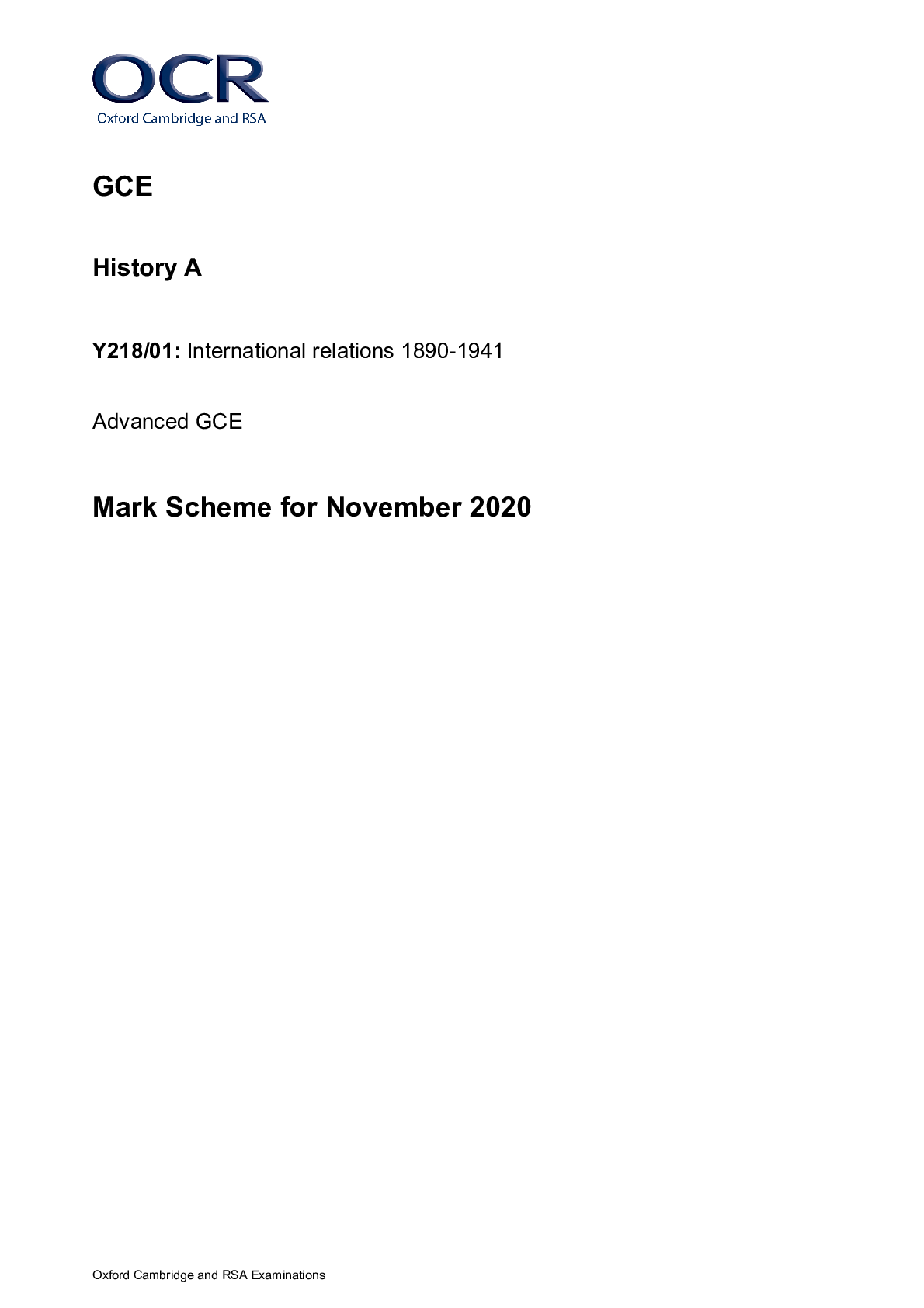
Reviews( 0 )
Document information
Connected school, study & course
About the document
Uploaded On
Oct 10, 2022
Number of pages
12
Written in
Additional information
This document has been written for:
Uploaded
Oct 10, 2022
Downloads
0
Views
32

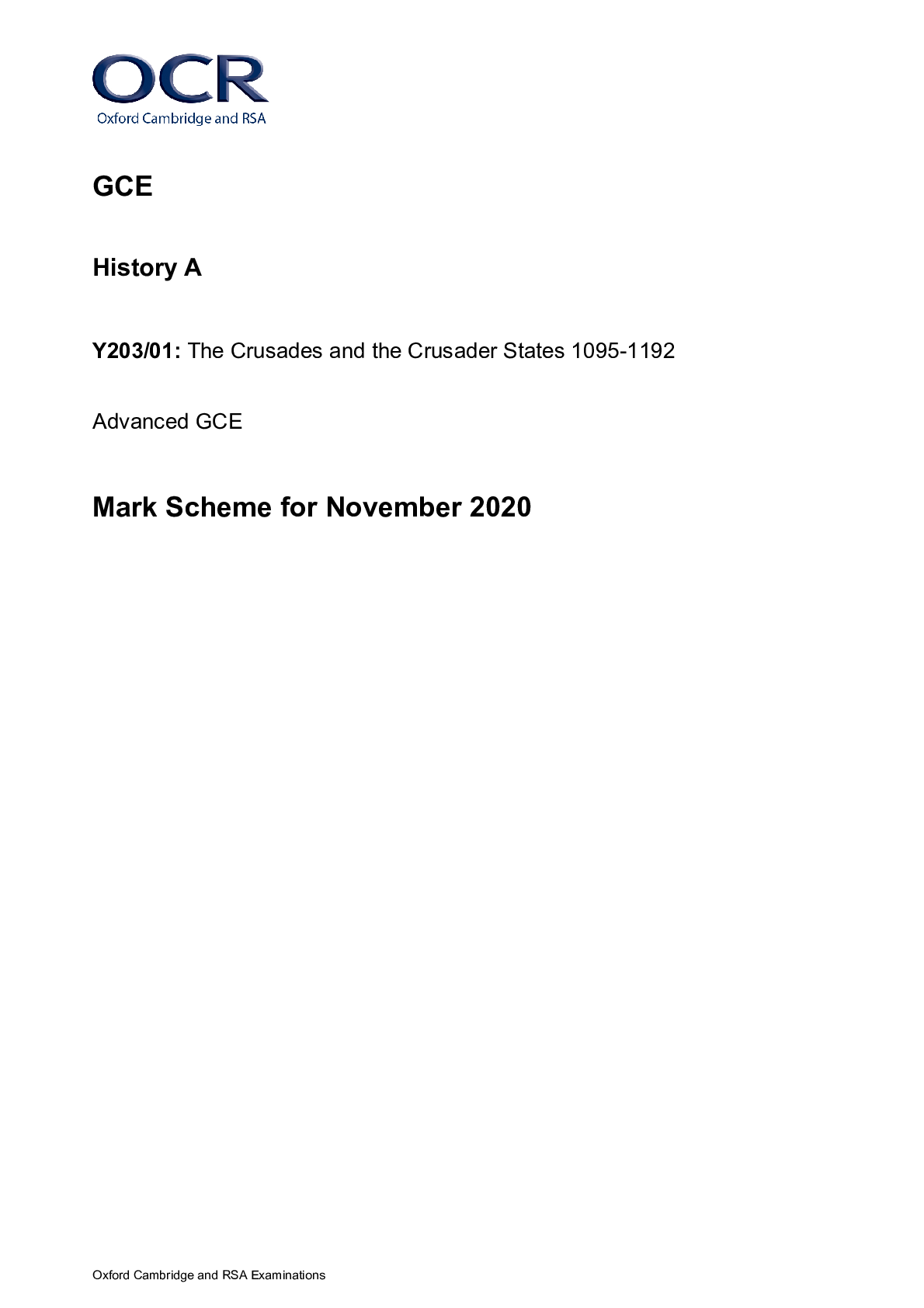
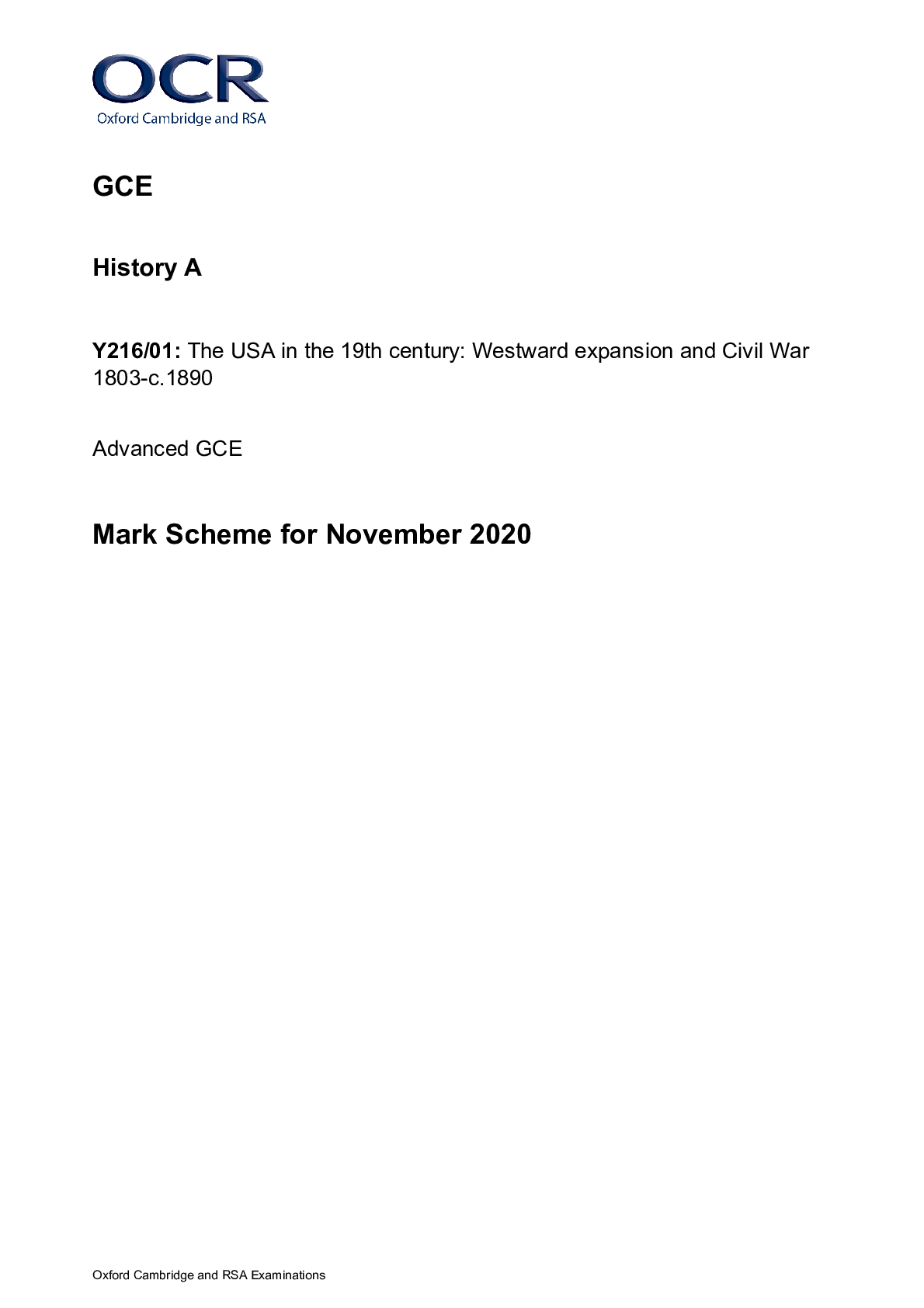
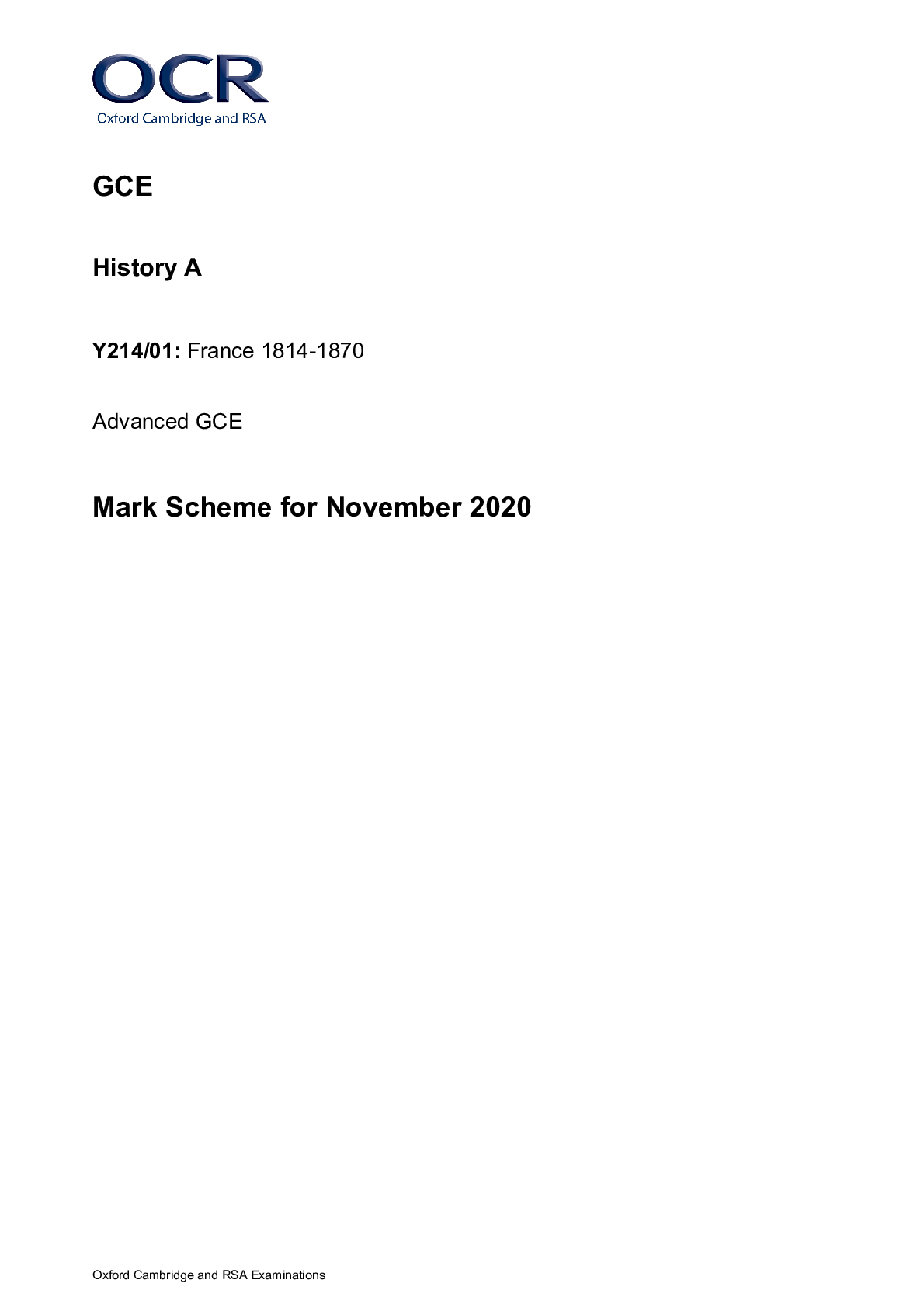
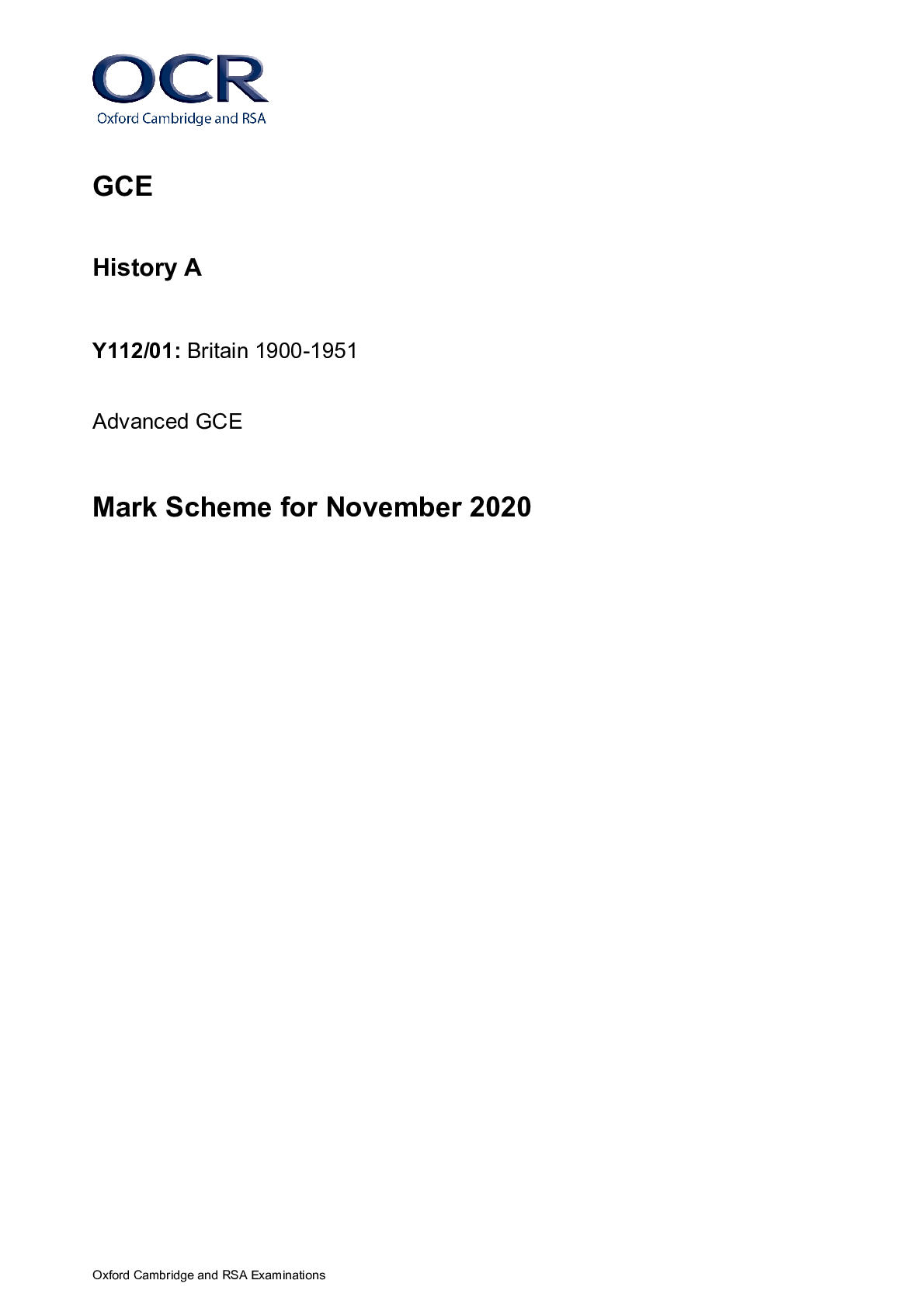
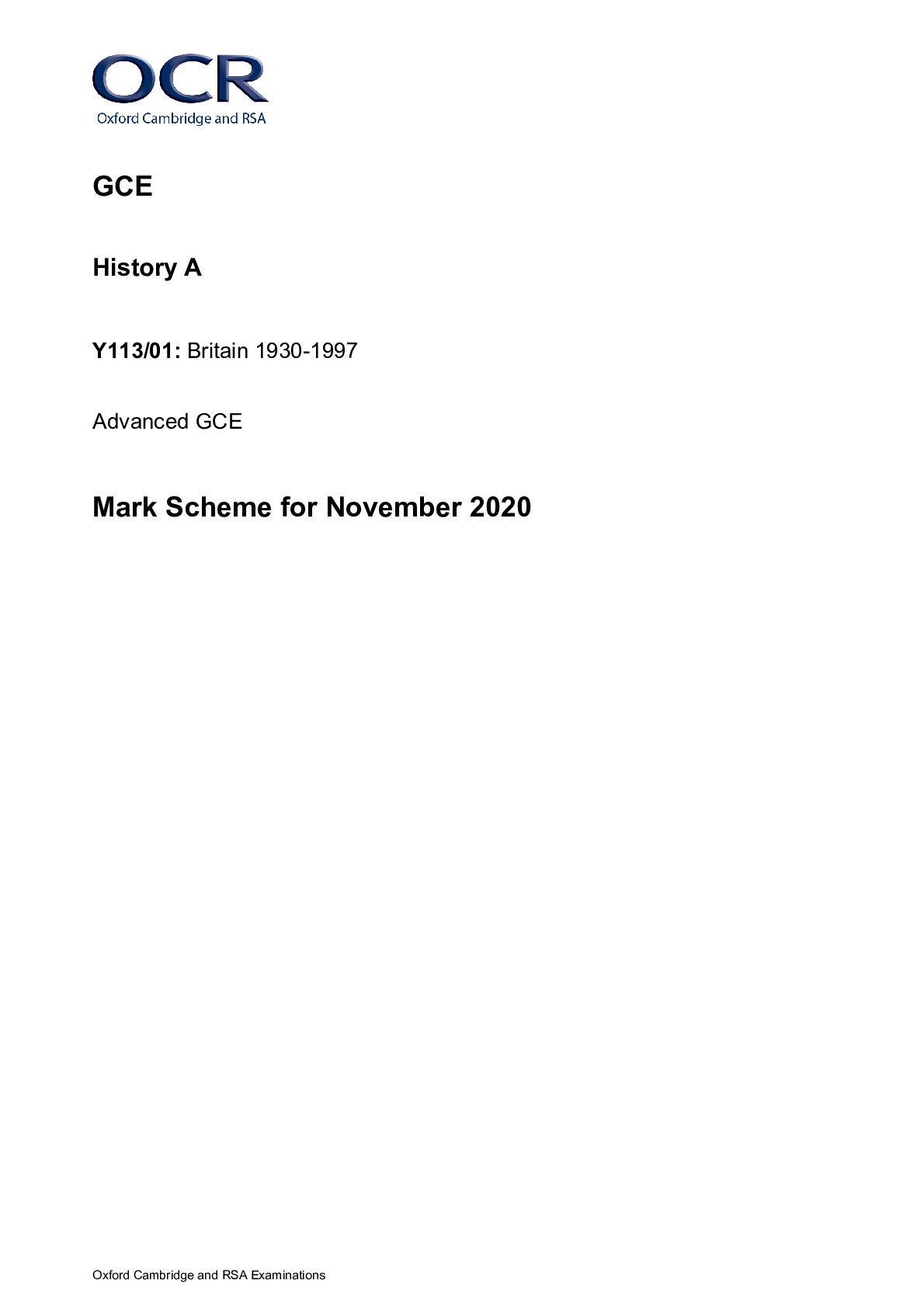
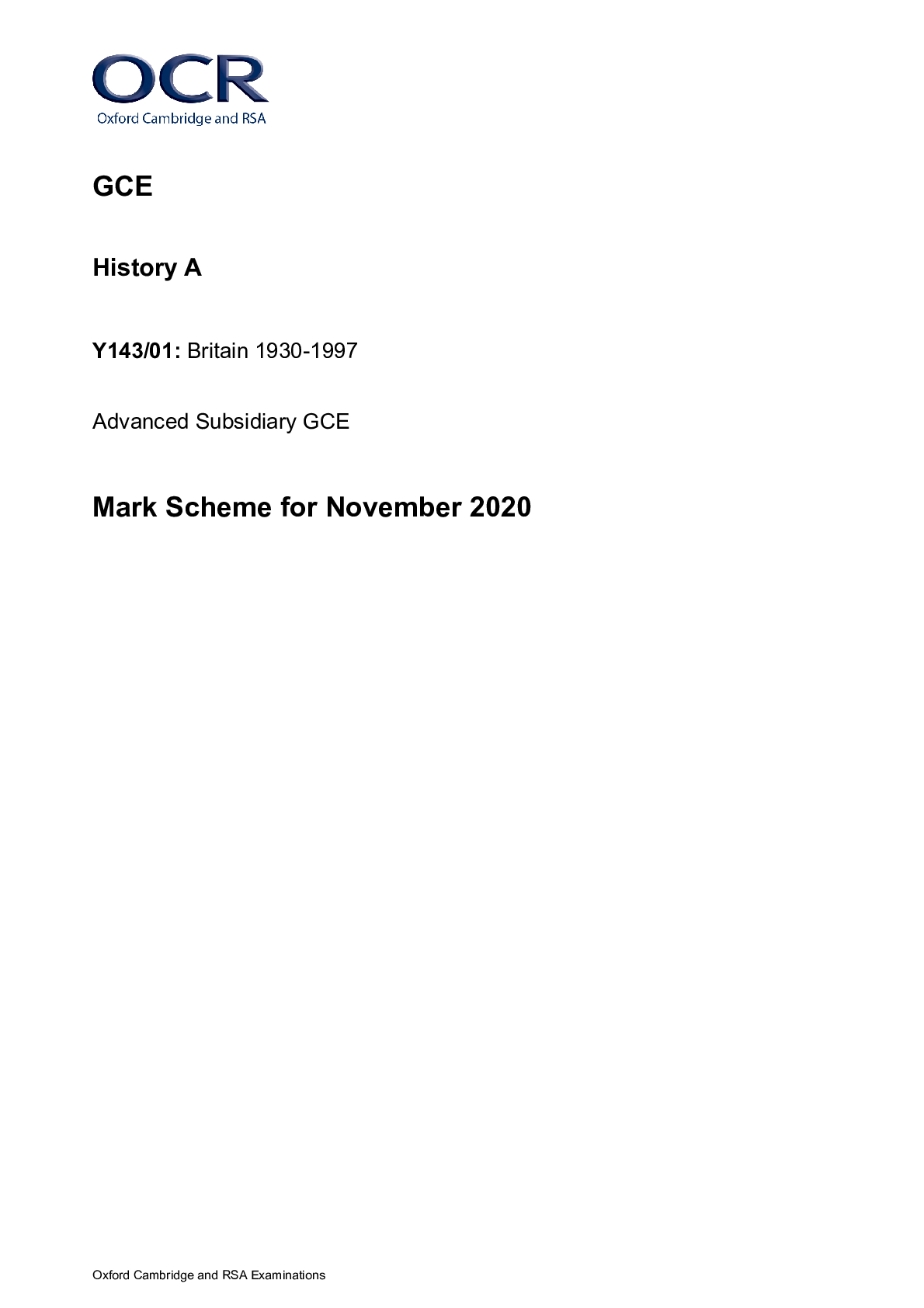
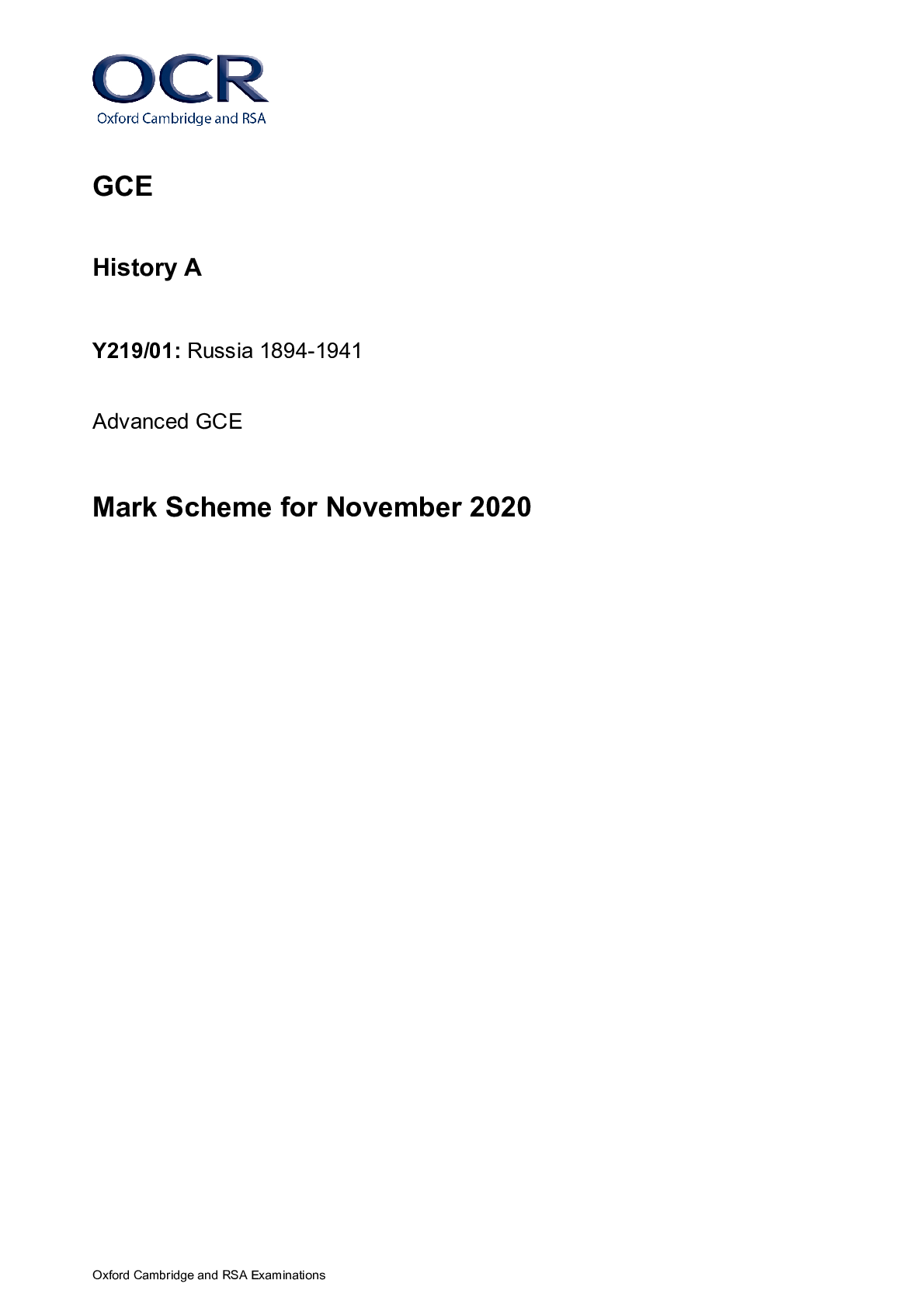






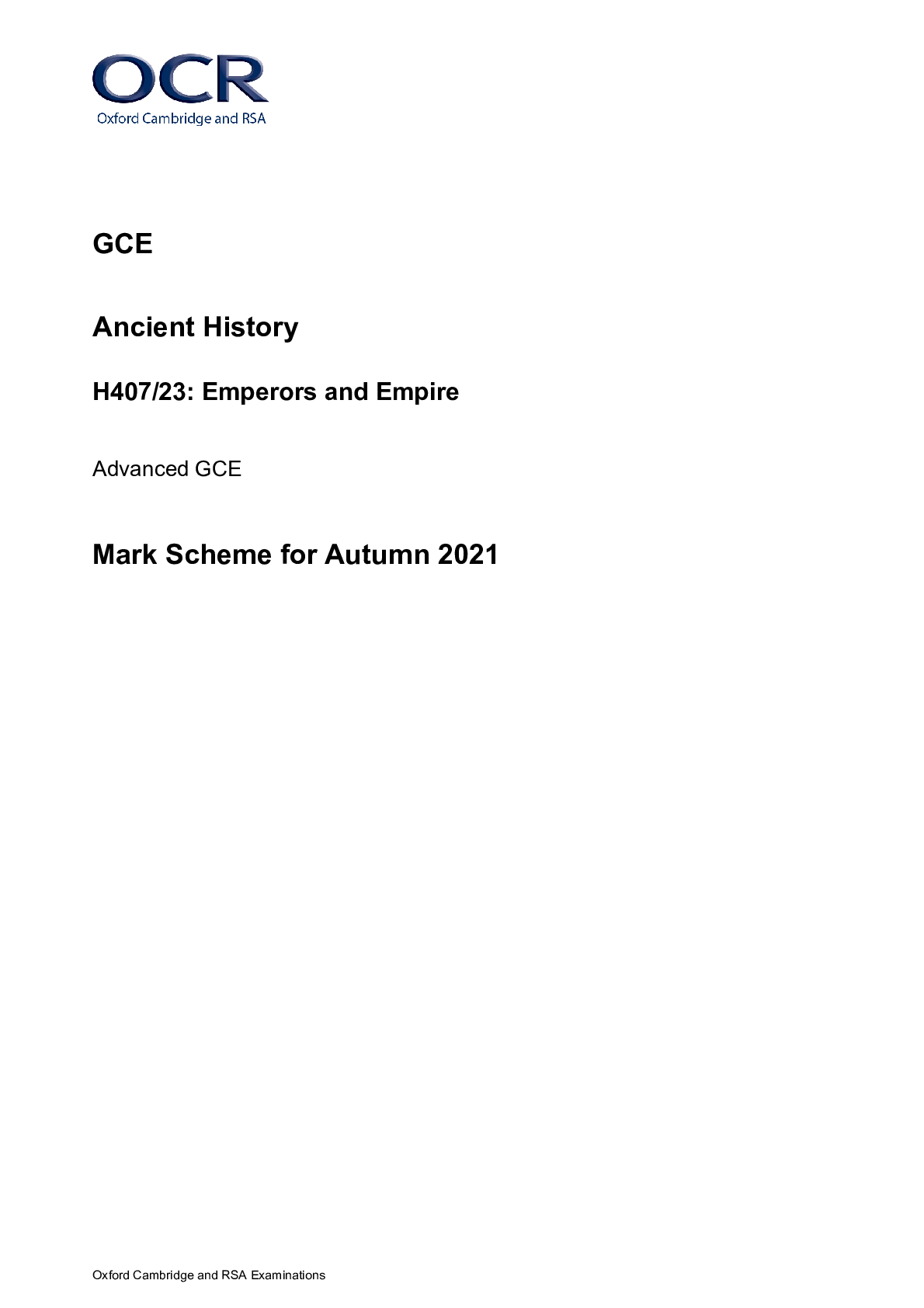
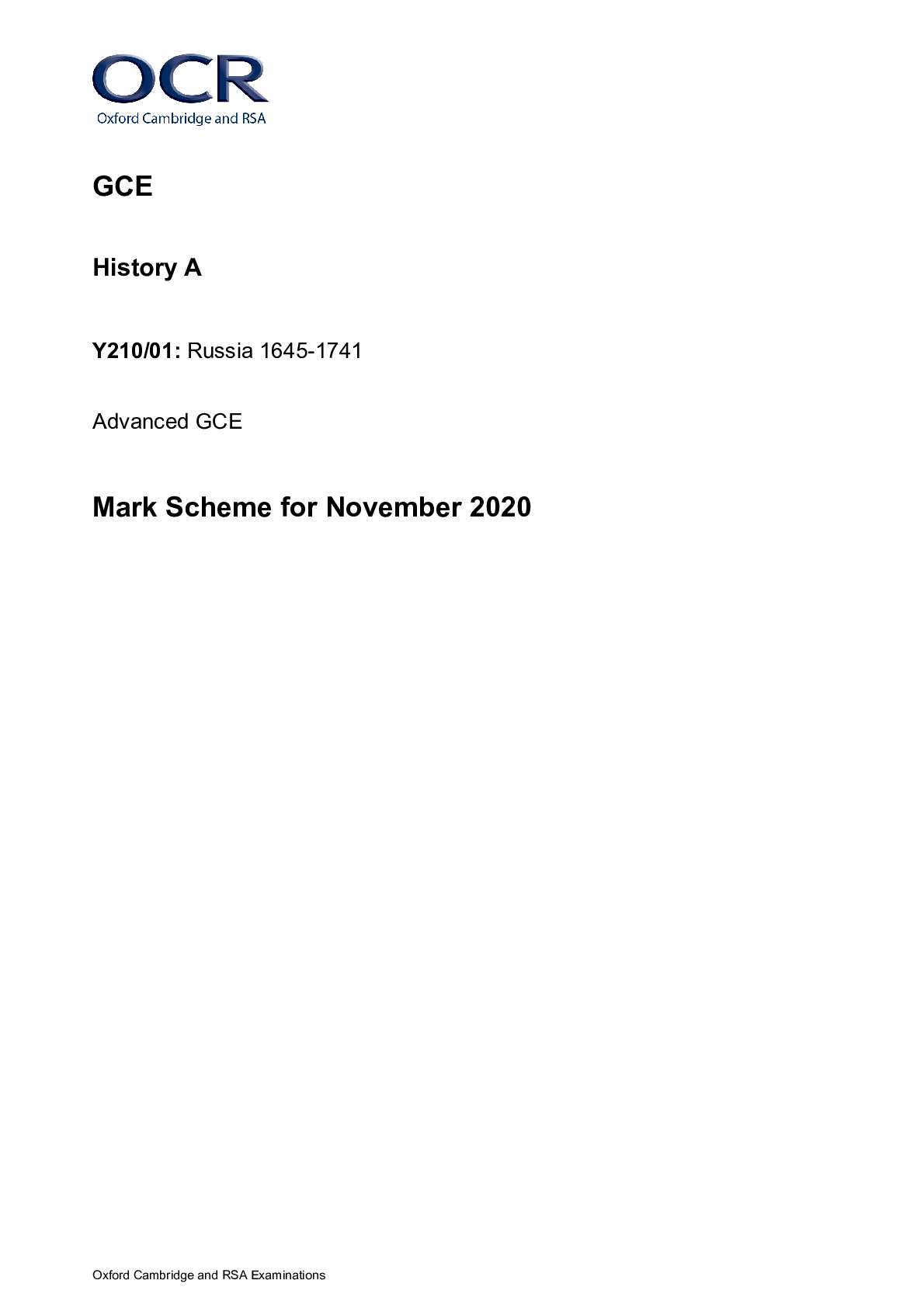
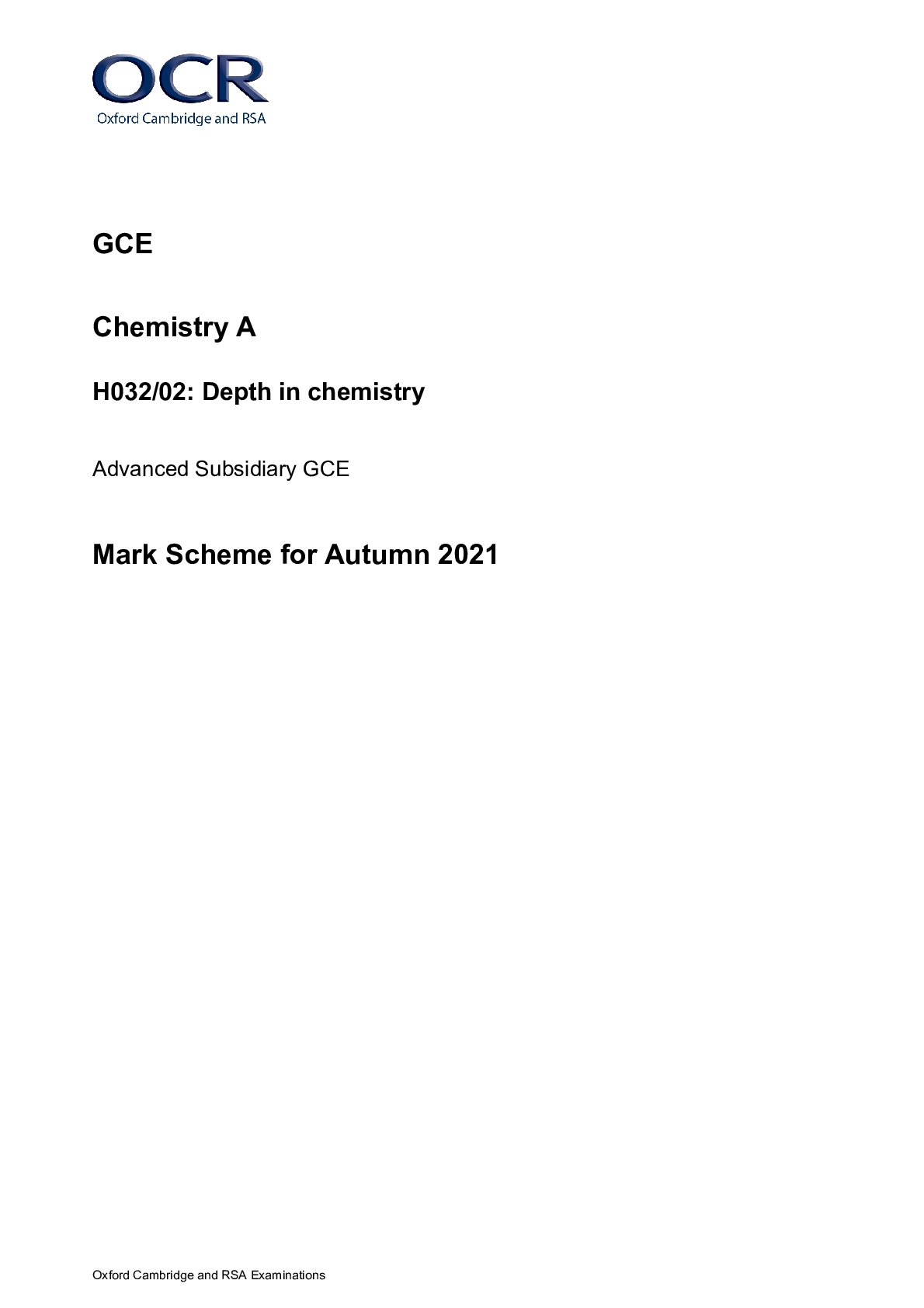
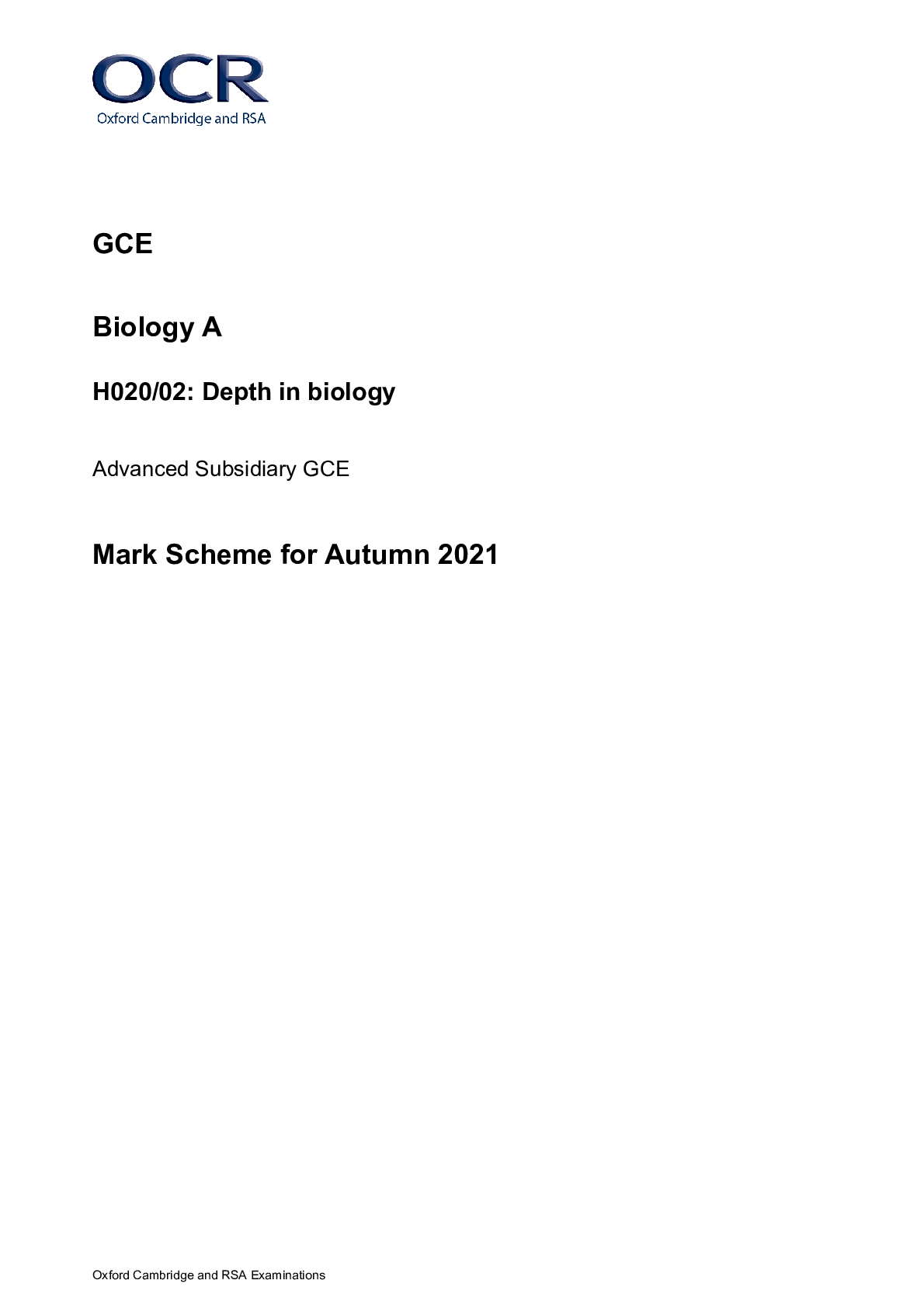
.png)

